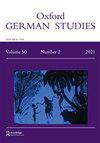Umstrittene Stadt: Das Wienbild Veza Canettis
IF 0.1
3区 文学
0 LITERATURE, GERMAN, DUTCH, SCANDINAVIAN
引用次数: 0
Abstract
Vienna is the location for most of Veza Canetti's stories and plays but, just as in the Viennese works of her husband Elias Canetti, it is rarely if at all mentioned by name, a literary technique which underscores the city's intimidating presence. City landmarks restrict the behaviour of her working-class characters who feel themselves excluded. They have often moved to Vienna from elsewhere and are not properly accepted. Motifs of arrival and departure occur so frequently in her writing. Even the violent behaviour of Herr Iger in Der Oger can be explained by his insecure status. After the Workers’ Uprising of February 1934 Vienna becomes a tabu subject. Only in exile after 1938 does she once again address the city of her birth which has now become enemy territory. *wiza Canettis
维也纳是维扎·卡内蒂大部分故事和戏剧的拍摄地,但就像她丈夫伊莱亚斯·卡内蒂的维也纳作品一样,维也纳的名字很少被提及,这是一种强调这座城市令人生畏的存在的文学技巧。城市地标限制了她的工人阶级角色的行为,他们感到自己被排斥在外。他们经常从其他地方搬到维也纳,并没有得到适当的接纳。到达和离开的主题在她的作品中频繁出现。甚至《Der Oger》中艾格先生的暴力行为也可以用他不安全的身份来解释。1934年2月工人起义后,维也纳成了一个禁忌话题。只是在1938年之后的流亡中,她才再次向她出生的城市发表讲话,而这座城市现在已成为敌人的领土。*
本文章由计算机程序翻译,如有差异,请以英文原文为准。
求助全文
约1分钟内获得全文
求助全文
来源期刊

OXFORD GERMAN STUDIES
LITERATURE, GERMAN, DUTCH, SCANDINAVIAN-
CiteScore
0.10
自引率
50.00%
发文量
2
期刊介绍:
Oxford German Studies is a fully refereed journal, and publishes in English and German, aiming to present contributions from all countries and to represent as wide a range of topics and approaches throughout German studies as can be achieved. The thematic coverage of the journal continues to be based on an inclusive conception of German studies, centred on the study of German literature from the Middle Ages to the present, but extending a warm welcome to interdisciplinary and comparative topics, and to contributions from neighbouring areas such as language study and linguistics, history, philosophy, sociology, music, and art history. The editors are literary scholars, but seek advice from specialists in other areas as appropriate.
 求助内容:
求助内容: 应助结果提醒方式:
应助结果提醒方式:


